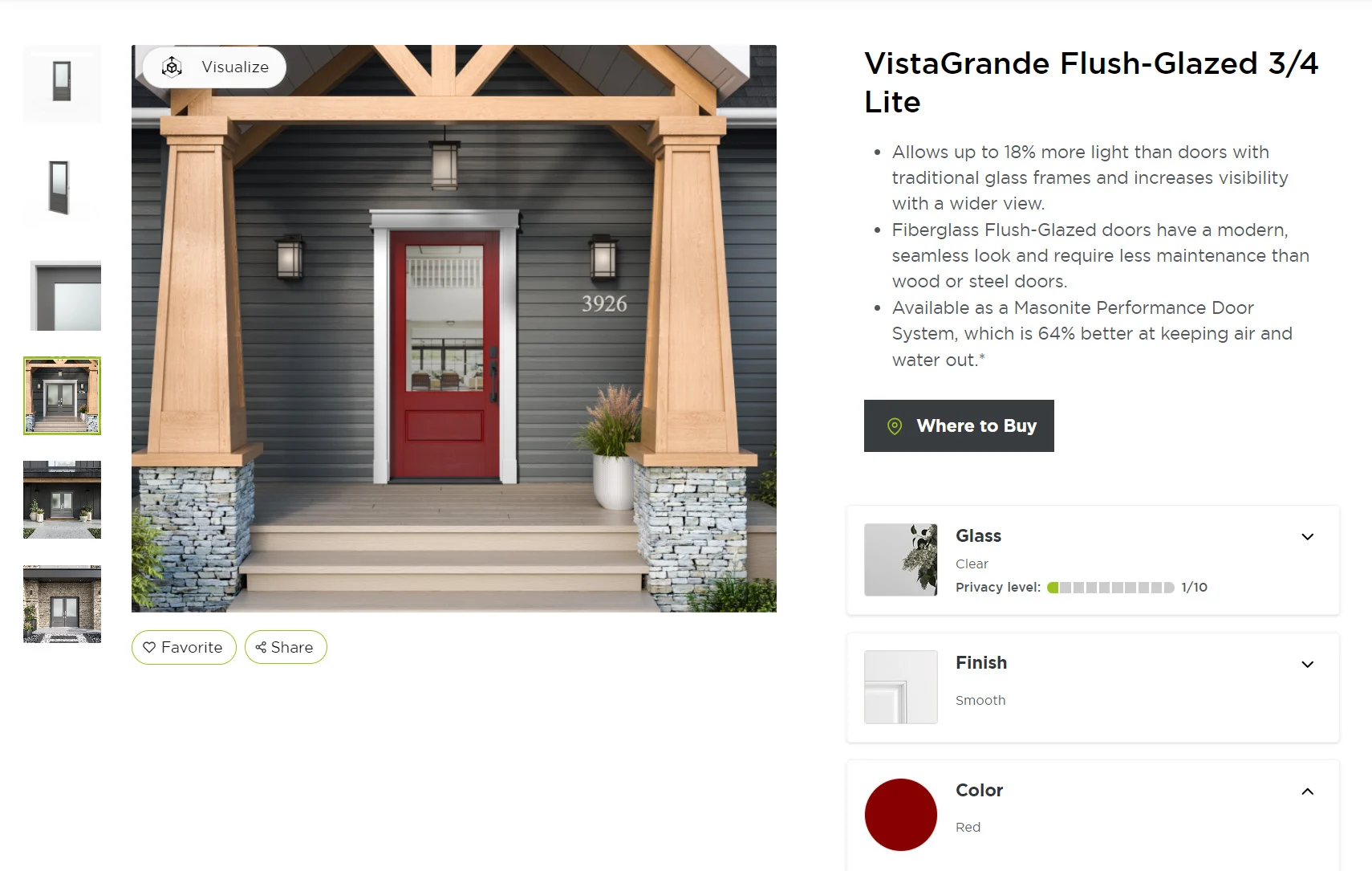The Ultimate Guide to AI-Driven Guided Selling
Imagine yourself in this all-too-common scenario: you’re in the market for a new kitchen sink as part of your latest home renovation project. You find a great website with lots of tempting options, but you’re not sure whether a farmhouse sink or an undermount is better for your kitchen, and whether a single or double bowl choice is right for you. After all, how often do you buy a sink?
With a typical ecommerce experience, you wouldn’t be left with much guidance here, and you’d likely eventually close the page without making a purchase because you don’t have enough information to make a final decision. But with AI-guided selling, you get more than just a search bar. You get custom answers to every question you have about options for your new kitchen sink, right in the shopping page.
No more toggling between product pages, hopping off to review sites, or shopping cart abandonment due to unanswered questions. It’s not just the future of selling: it’s already here.
What is AI Guided Selling?
In essence, guided selling uses machine learning (ML) and natural language processing (NLP) to help personalize the customer experience and increase sales revenue.
The expanded definition is that AI-guided selling creates an interactive, customer-centric approach that helps shoppers navigate their purchasing decisions through a series of tailored questions, suggestions, and recommendations. This selling technology leverages customer data and advanced algorithms to create personalized shopping journeys that lead to more satisfied customers and higher conversion rates.
The concept of guided selling has been evolving since the early 2000s, but it has gained significant traction in the last decade with the rise of artificial intelligence and machine learning capabilities. What was once a simple decision tree has transformed into a sophisticated guided selling system powered by AI that can adapt in real-time to customer preferences.
Think of guided selling as a new way of providing customers with the answers they need to make purchase decisions of any kind. Much like a friendly, experienced saleswoman would help you pick your first lipstick at the department store cosmetic counter, guided selling provides that same help and guidance digitally and around the clock.
As we look toward the future of ecommerce technology, AI in ecommerce is becoming increasingly central to the shopping experience. Modern guided selling platforms represent the next evolutionary step in how businesses connect customers with products that genuinely meet their needs.
Guided Selling Examples
What does guided selling look like in real companies, in both the B2B and B2C world? Here are three inspiring examples.
1. Therma Tru’s SmartDoor Finder

Therma-Tru’s SmartDoor Finder is like having a personal door-shopping assistant right at your fingertips. Just snap a photo of your current door (or the style you’re dreaming of), and the tool uses smart technology to instantly suggest doors from Therma-Tru’s collection that fit your aesthetic and needs. It takes the guesswork out of picking the perfect entryway, making your shopping experience faster, easier, and way more fun. This is a great example of guided selling—helping you find exactly what you want without any hassle.
2. IKEA’s Kreativ Custom Furniture Configuration

IKEA’s innovative and fun Kreativ tool uses guided selling software to scan your space and place IKEA items, from furniture to home decor and more, in your own space in their actual dimensions. The system provides recommendations that fit perfectly within your space and the opportunity to compare and swap out products, while staying within your budget. It’s like having an interior designer on call 24/7, for free.
3. HubSpot’s Guided Selling Software

HubSpot’s Sales Hub tool is an AI-powered guided selling powerhouse, identifying promising opportunities and the optimal next actions to move prospects through your pipeline. By analyzing leads, deals, and target accounts in a single workspace, the platform surfaces company insights and buyer engagement analyses, significantly shortening sales cycles and transforming prospect interactions.
For more inspiration, check out five examples of companies successfully using guided selling.
Key Elements of Guided Selling: How it Works
Consumers today have an astonishing volume of options at their fingertips, no matter what they’re buying. In fact, 78% of shoppers feel overwhelmed with the amount of product choices available to them. Hesitation in the purchase process is often due not to a lack of good choices, but too many choices to make a final decision.
AI-guided selling provides a friendly, knowledgeable assistant that helps shoppers find exactly what they need, patiently answering all of their questions at any time of day.
But AI-guided selling is more than just a product-focused chatbot. The foundation of effective guided selling rests on four core elements:
- Interactive, conversational interfaces
- Leveraging customer data and history
- Advanced AI and machine learning
- Personalized product recommendations
Let's take a closer look at how each of these components work together to create a streamlined, intelligent shopping experience.

Interactive Q&A Formats
At the heart of any effective guided selling platform is a dynamic questionnaire that adapts to customer responses. Unlike static forms, interactive Q&As ask relevant follow-up questions that help narrow down options without overwhelming the customer. It’s more like chatting with a friendly human salesperson than a quiz. This creates a conversation-like experience that keeps shoppers engaged throughout their buying journey.
Leveraging Customer History and Data
Modern guided selling systems use data-driven insights from previous interactions, purchase history, and browsing behavior. This historical context allows the artificial intelligence system to make more accurate predictions about customer preferences and needs, creating continuity in the buying experience across multiple sessions or channels and allowing deeper personalization throughout the buyer experience.
AI in Ecommerce and Machine Learning
What truly sets contemporary guided selling apart is how it leverages AI algorithms and machine learning (ML) to analyze vast amounts of customer data and identify patterns that humans might miss. These AI models continuously learn from each interaction, making recommendations increasingly accurate over time. The technology can analyze thousands of product attributes against customer preferences to identify the most relevant product matches in milliseconds, much like a salesperson with decades of experience can immediately identify and fulfill customer needs.
Tailored Product Recommendations
The culmination of these elements is a set of highly personalized product suggestions that align with the customer's specific needs. Unlike basic filtering systems, advanced guided selling technology can balance multiple competing priorities (such as budget constraints against feature preferences) to suggest the optimal solutions for each individual buyer.
They can even help upsell complementary products or services that enhance the initial purchase, driving not only more sales but also higher levels of customer satisfaction and loyalty.
How Guided Selling Benefits Businesses
AI-guided shopping experiences provide businesses with a wide variety of benefits, which can all be boiled down to the improvements they offer in the customer journey and experience. They allow ecommerce companies to combine the ease and convenience of online shopping with the personalized and knowledgeable guidance of an AI guide or tool.
Here are just a few of the data-backed benefits companies who use guided selling solutions can expect to see.
Increased Conversion Rates
Salesforce research found that AI-powered shopping agents drove 20% higher sales during Cyber Week in 2024 compared to the previous year, and the technology is only getting more powerful. By helping customers find exactly what they need faster, these systems dramatically reduce abandonment rates and increase the likelihood of purchase completion.
Higher Revenue
Companies report 6-10% higher revenue when using advanced digital personalization tools like guided selling. The system can intelligently suggest relevant complementary products or appropriate upgrades that genuinely add value to the customer's purchase, improving conversion rates while decreasing return rates and thus boosting revenue.
Enhanced Customer Satisfaction
Businesses that use predictive models report 20% higher customer retention rates, reflecting increased customer satisfaction. Guided selling works by creating these personalized experiences that make customers feel understood and valued, leading to higher loyalty rates than in non-personalized shopping environments.
Reduced Return Rates
Businesses using AI-powered ecommerce guidance report up to 35% lower return rates compared to standard approaches. Imagine a virtual assistant who can give every customer details like measurements, materials, and anything else they need to know to make the right purchase the first time—that reduction in returns and exchanges goes right to the bottom line.
This benefit requires inputting very exact and accurate product information for the AI-powered e-commerce system to use, however, as the system is only as good as the data it has on hand. For example, clothing brands will need to have measurements for each item in every size for a guided selling system to accurately advise customers on which size will fit their exact measurements.
Valuable Customer Insights
Every interaction with a guided selling tool generates valuable data about customer preferences, pain points, and decision factors. This intelligence helps businesses refine their product offerings, marketing messages, and even price quotes based on actual customer behavior rather than assumptions.
One caveat here though: with this increased data access comes increased privacy concerns as well. All of this customer data must be treated with respect, transparency, and an eye to any legal restrictions on customer data.
Streamlined Sales Process
By automating the discovery phase and qualification process with guided selling tools, sales teams gain access to valuable customer data and insights instantly. This frees up sales professionals to focus on addressing specific needs rather than gathering basic information, making the entire guided selling process more efficient. They can gain more time to conduct personalized interactions with precise targeting, increasing sales.
Guided selling empowers businesses to win
AI guided selling transforms how businesses connect customers with the right product or service by creating intelligent, responsive customer journeys that reduce product overwhelm and help customers make the perfect choice for them, every time.
By implementing these systems, companies can provide expertise at scale, ensuring that every customer receives the same high-quality guidance they would get from your most knowledgeable sales representative.
The combination of data-driven insights and AI assistance for ecommerce creates opportunities to understand customer needs more deeply than ever before. This understanding translates directly into more meaningful connections, stronger brand loyalty, and ultimately, sustainable growth. And conversely, successfully leveraging guided selling tools requires a deep understanding of your customers, including their pain points, buying journey, and how your products serve them best.
As AI shopping assistants become increasingly sophisticated, the businesses that leverage these tools effectively will establish themselves as customer-centric leaders in their industries. Guided selling isn't just about driving transactions or saying you use AI for the sake of it—it's about building long-term customer relationships through anticipating and meeting their needs seamlessly.
Interested in seeing what guided selling can do for your business?
Learn more about Threekit’s AI Guided Selling solution today


